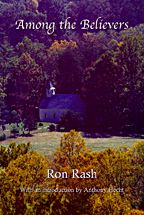Plagiarist.com Articles
Ron Rash's Among the Believers
Among the Believers
by Ron Rash
96 pages | PB $12.00 | Iris Press | 2000
ISBN: 0916078507 | Order from Amazon.com
Ron Rash's second book, Among the Believers, encapsulates a landscape, in this case the Carolina Appalachians, as few poets are capable of capturing. Reading these poems you get the sense that the poet knows this place - and he should. According to the biographical note, Rash's family has lived in these mountains for the past 250 years, making the folklore, traditions, stories, and heritage of this particular place those of his own family. If the poems are not necessarily autobiographical, the confidence of Rash's knowledge about this area gives these poems additional weight - the total presence of a place.
The poems are about simple mountain folk, mostly, but Rash approaches them with tenderness, and never condescends, mostly because, well, he's one of them. The poems too are solid, dependable mountain poems that are rich with complexity and subtlety.
From the first lines of the book Rash acquaints you to the world of this Southern mountain area and its history:
from On The Border Today it's still hard country, bare hills, dark valleys, gray juts of stone against gray sky. Here men argued map lines with blood, raised death like a seed crop when their hearts became the landscape, as did their acts.
There's a toughness in Rash's work that has the potential to be cheesy, but never quite is. He doesn't exploit easy tragedy for effect - even in a poem like "The Confession" where the speaker confesses to killing her own child, the authenticity of Rash's voice grounds the poem in reality, in the actual. "She hacked the throat of her child / with a knife more rust than steel ... what most / remembered was the word stung / from her tongue on a sandbar, / and that one word was murder."
The short line, coupled with the internal rhyme (such as stung/tongue) throughout the poem really makes things move. Although you can't tell from the above excerpt, the pace of the poem is also quickened by the fact that the entire twenty-six line poem is all one sentence.
Many of the poems, including "The Confession," are written in a seven- syllable line. This syllabic line brings a tightness and precision that syllabic forms tend to instill.
One of the poems that poet Anthony Hecht mentions in his introduction is "The Corpse Bird". This short poem (also a single sentence) is filled with what novelist Don DeLillo would call "American magic and dread."
The Corpse Bird Bed-sick she heard the bird's call fall soft as a pall that night quilts tightened around her throat, her grey eyes narrowed, their light gone as she saw what she'd heard waiting for her in the tree cut down at daybreak by kin to make the coffin, bury that perch around her so death might find one less place to rest.
A sick woman, laying in her bed, presumably sick enough that her kin would be ready to prepare a coffin for her, is listening to a bird she associates with death (I'm not sure if the bird itself is death, or if like a vulture it merely stalks the dead - there's a folk tale in suburban Pennsylvania where I grew up that the coo of a dove outside the window means someone's going to die).
Rash's exact rhymes are a bit much in the first two lines (call/fall/pall) but the rhyme of "night" and "tightened" is perfect - the past-tense extension almost enacts the tightening itself. It's both funny and tragic that she thinks about the tree in which the bird is perched will be cut down to make her coffin, and so when she's buried she'll take the place her death rested with her.
There's an occasional misstep, as in "Air and Angels" which opens "I loved the way the sun struck / like a match" and closes with "an angel's face leaned close / enough to whisper my name." I'm not sure if the sun striking like a match is oft-used enough to be cliché yet (although a quick search in Google.com for the string 'sun struck match poem' revealed at least four poems that use the phrase 'the sun struck like a match' so perhaps it's a bit hackneyed after all), but I've heard it before and it's less inventive than other similies in the book. As for the angel's face - is this meant to be taken literally? I could simply be betraying my secular reading of the poem, but if the angel is in fact metaphoric than the saviour/angel thing's been done to death. "Air and Angels" is probably the weakest point in an otherwise above-average collection.
I think writing about a particular time and place without connecting the poems more directly usually hurts a book as a whole, where by mid- point the novelty has worn off and the poems tend to start feeling collectively stale. Rash's work may be of limited range, but it's a limitation by choice and it almost works for the entire collection (he succeeds admirably on this point in his next book, Raising the Dead).
All told, Among the Believers is a fine sophomore effort that shows that what Rash lacks in range he makes up for in clarity and directness in diction. These poems work best when taken individually, although something tends to accrue as a whole. Each poem contributes another aspect of the Carolina Appalachians life. Rash always finds exactly the right voice for his speakers, whose authenticity and knowledge of this place and its history bring the volume together, even for a city-boy like me.
![[home]](http://plagiarist.com/images/home.gif)
